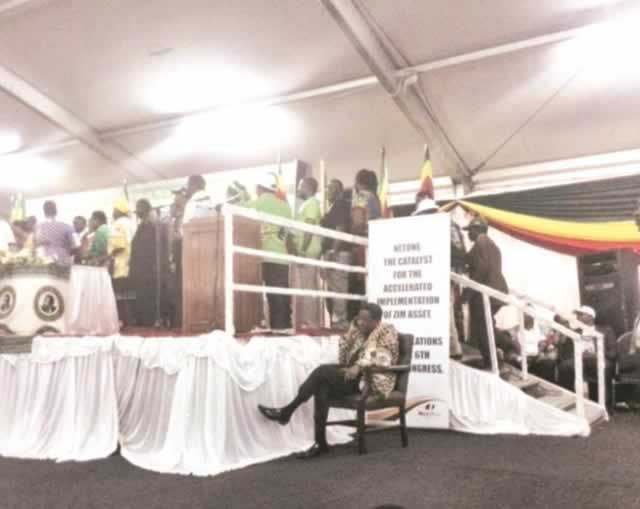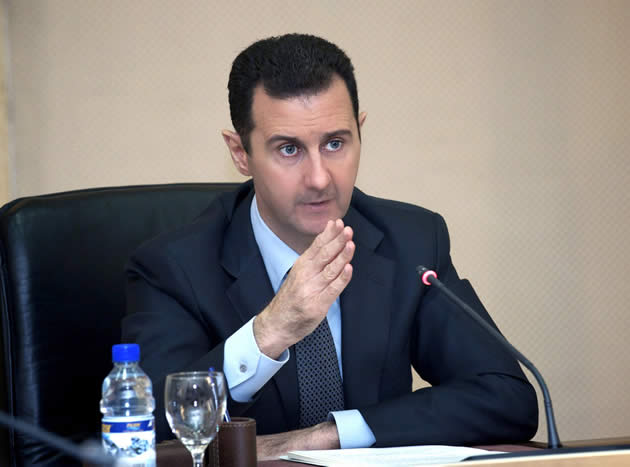Congress: No losers, just a winning Zanu-PF


The forlorn figure of Webster Shamu at the bottom of the dais, summed up the fate of the man who was found in the Mujuru basket
Tichaona Zindoga Political Editor
“Yet, if truth be told, zanu-pf was better off emerging from the congress in the manner it did, without much blood on the floor, even if this displeased expectant quarters, mainly journalists. This is where the mastery of one Robert Mugabe, the leader of zanu-pf comes in…”
It is all very easy to view and review the just-ended Zanu-PF 6th National People’s Congress in binary terms. In fact, all the fever and temperature that it created were predicated on the propensity to see events and developments in the party in Manichean or dualistic terms. There were good and bad guys, and this is how the media and the general public viewed the historic congress.
The activities that took place in the run-up to the indaba pretty much cultivated these binaries, which saw the fall of people aligned to a certain faction — the faction of Vice President Joice Mujuru who was implicated in a nefarious plot to unconstitutionally unseat her boss, President Mugabe.
In which case, the majority of patriots and Zanu-PF felt repelled by her and her cabal that included the likes of Didymus Mutasa, Rugare Gumbo and Nicholas Goche. Rightly so.
On the other hand, these people became instant hits with those opposed to President Mugabe and the revolutionary ethos in general, with unprecedented revolutionary plaudits now showering on Rugare Gumbo, the “bravest face” of the conspiracy, even from unlikely and ironic climes such as Britain.
The five-day show-piece was thus expected, at its climax which was supposed to come on Saturday, to pronounce the winners and losers of the mortal contest between the good and bad guys.
In fact, there were reasonable expectations that the congress would be so divisive, so unequivocal and so mutually exclusive between the protagonists.
Yet, somehow, this did not happen.
First, it was because the VP Mujuru faction had been enervated or weakened by the removal from the picture of her clique of backers such as Gumbo and the renegade, bellicose Jabulani Sibanda.
VP Mujuru herself did not help her cause by not attending the event, whatever her reasons. The expectation was thus that Zanu-PF would go on and publicly hang Joice Mujuru for her many sins.
It did not.
In fact, there was no motion to lynch the poor woman: processes and procedures, as well as her decision not to partake of the event, marked her out.
No-one demanded or drank her blood yet she had fallen; fallen alongside her conspiratorial comrades. Now to propose, or pose, as the case might be, that there were no losers in all this is a little problematic.
Especially if one saw the forlorn figure of one Webster Shamu, a Mujuru conspirator who fell by the wayside but was cruelly sat at the bottom of the dais and was supposed to take in the mocking eyes of thousands of people in the congress venue; his own eyes red, with their traditional heavy bags and sad and mere chinks within sagging skin on his long face.
Boy, oh boy, that was so poignant.
Yet, if truth be told, Zanu-PF was better off emerging from the congress in the manner it did, without much blood on the floor, even if this displeased expectant quarters, mainly journalists.
This is where the mastery of one Robert Mugabe, the leader of Zanu-PF comes in.
That he resolved to leave the appointment of his deputies and the Politburo to another day was a tactical master-stroke, which allowed tempers to cool and avoid the pitching of emotions in the party.
(One could imagine this particular province and others straight away going after the public enemies.)
President Mugabe proved Fox the fair abirter. The appointments will come, at their own time, and still legitimate time.
It is little doubt from this, and the general outlook of Zanu-PF after all the hubbub, that the biggest winner was the party as it emerged dispassionate, united and focused.
It will be useful also to highlight that President Mugabe did not, apart from some necessary home truths, seek to unduly antagonise those that fell by the wayside. He told them they could remain in the party. They were free to do their business as farmers.
They would be free to commit to Zanu-PF on the proviso that they fully appreciated its history and revolutionary thrust. All this shows the magnanimity of the leader of the revolutionary party who is not unknown to such concessions and indulgences: a cursory look at the recent historical epochs will confirm this.
More importantly, it is the same spirit that allows the party to move forward in spite of its own contradictions.
An important aspect to hedge against these contradictions, at least in the present epoch, lies in the amendments to the constitution. The provision that the party leader ought to choose his close lieutenants (and possibly successor) quickly comes to mind.
However, how about the provisions for the spelling out of the party’s vision and mission, which focus on, “(f)orever to remain the mass revolutionary socialist party in the emancipation process of the people of Zimbabwe from all forms of oppression”; and “(t)o maintain total ownership, control and equitable distribution of the means of production, natural resources and the defence of the national sovereignty, policies of indigenisation, empowerment and wealth creation so as to sustain the independence of Zimbabwe, and to remain forever masters of our own destiny”?
There are important aspects in these two statements outlining what an enduring phenomenon and institution like Zanu-PF ought to be in terms of ideology, identity, sovereignty and self determination.
The resolutions (although hard hitting and binary in places) cast a fair light on the vision of a party grounded in the people, in ideology and the need for economic prosperity for Zimbabweans.
The economy
Someone rather sensationally claimed that the “biggest loser” at the Zanu-PF Congress is the economy. It is an accusation that has been so free to direct against Zanu-PF. One would be tempted to think that while party was at war with itself, it did not care for the economy.
However, this is not the whole truth for, during the same Congress deliberations were held to assess the state of the economy and proffer solutions to the maladies it faces.
The party itself identified significant maladies, including “…illegal sanctions, constrained fiscal space, depressed economic performance, a disproportionately high wage bill, the continuing liquidity challenges, poor state of public infrastructure, constrained investment and revenue inflows, the haemorrhaging of State Enterprises and the scourge of rampant corruption in both private and public enterprises.”
Zanu-PF further noted pricing distortions in the economy emanating from the financial meltdown and hyper-inflationary era as well as the introduction of the multiple currency exchange regime and acknowledged the Look East Policy, and engagement with the BRICS countries and re-engagement with multi-lateral and bilateral financial institutions and traditional economic cooperating partners in the West.
That does not look like burying the head in the sand.
The ruling party then outlined several interventions to tackle the economy including, implementing mechanisms for unlocking the value that is inherent in Zimbabwe’s abundant natural and human assets; developing strategies that maximise the benefit that can be derived from the nation’s installed infrastructure and capacity,; encouraging SME growth and creating an enabling environment to attract Foreign Direct Investment.
In the other key sector, that of infrastructural development the party eyes the prioritization of financing power and energy generation projects and facilitation of the smooth functioning of public utilities, transport and telecommunication infrastructure as key enablers of economic growth, while actively decentralising public and social amenities infrastructure to rural areas, among other interventions.
And haven’t we heard all that before, one would ask dismissively?
Certainly, but there is hope that change in the manner in which Government operates, far from the constraints of the inclusive era and the parallel structures created in its aftermath by those who conspired to usurp power from the centre, there will be more harmony and direction.
A cabinet reshuffle is apparently coming.
And surely will Zanu-PF do itself any favour by not appointing capable men and women to deliver the goods?
Besides, 2018 is not far and the country has seen enough drama already and wants food on the table instead.










Comments